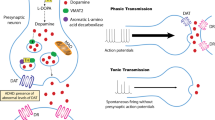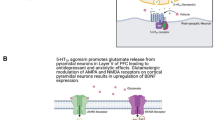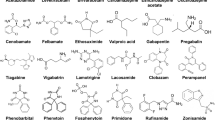Summary.
On a biochemical level, conventional antidepressants have been shown to modulate synaptic levels of biogenic amines (i.e., serotonin, norepinephrine, and dopamine), most often by interfering with reuptake processes or inhibiting metabolism. Strategies directed at modulating glutamatergic transmission may overcome the principal limitations (i.e., delayed onset and low efficacy) that appear to be inherent to these conventional agents. In this brief overview, I summarize two glutamate-based approaches to develop novel antidepressants. These distinct and (on a cellular level) seemingly diametric strategies may converge on intracellular pathways that are also impacted upon by chronic treatment with biogenic amine based agents.
Similar content being viewed by others
Author information
Authors and Affiliations
Additional information
Received July 6, 2001 Accepted August 6, 2001 Published online June 17, 2002
Rights and permissions
About this article
Cite this article
Skolnick, P. Modulation of glutamate receptors: Strategies for the development of novel antidepressants. Amino Acids 23, 153–159 (2002). https://doi.org/10.1007/s00726-001-0121-7
Issue Date:
DOI: https://doi.org/10.1007/s00726-001-0121-7




